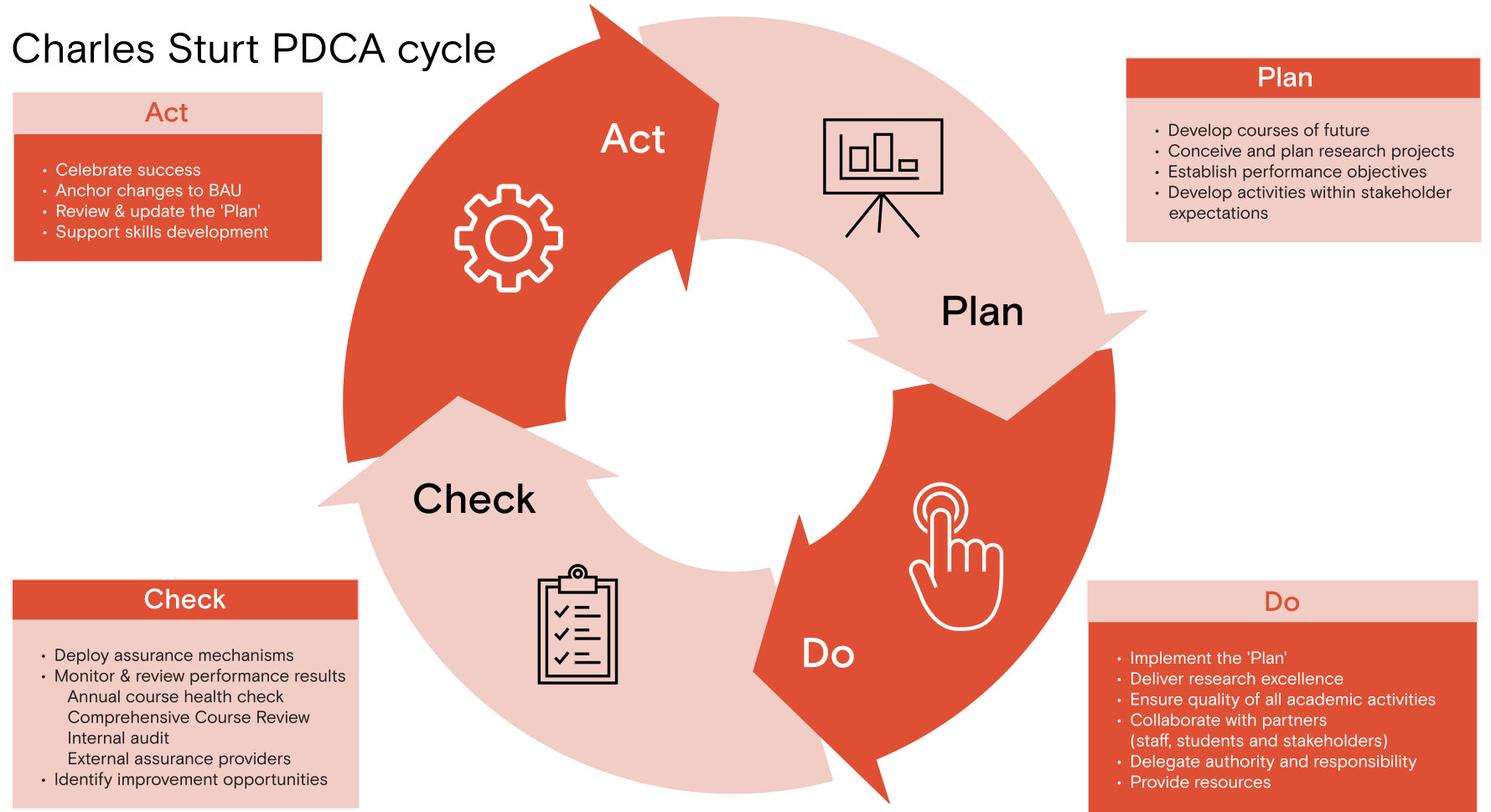Office of Academic Quality, Standards and Integrity
Academic quality encompasses quality assurance and quality enhancement at organisation, faculty and school levels.
Our culture supports quality in everything we do. This is made real in the work of our people and our engagement with our students. Collaboration is guided by our values, our purpose, our governance and our common policies and procedures. Our practices and focus on continuous improvement align with our University Strategy 2030 and will guide us to achieve excellence.
Our Education Framework guides us to provide high-quality education to all our students. It aligns our University Strategy with policy, clear education principles and a contextualised curriculum model guided by best practice in the sector. Our framework provides essential guidance for all levels of quality teaching and learning. It is also focused on facilitating positive student experiences and student success.
Our Academic Quality Policy provides clear guidelines focused on the key goals of achieving and ensuring the quality of all academic endeavours to enhance student outcomes.
Our quality curriculum management systems and practices help us to define, establish and maintain operations and governance that are fit for purpose. This ensures we can adapt to a changing world. One example of these systems is our Curriculum Design, Accreditation and Publication (CDAP) system. This system helps us to maintain and develop our operations for the academic quality of curriculum. It also assists us to demonstrate compliance and quality to show and to share how we are progressing. Through our CDAP system, we have oversight of our current operational status. This ensures we can identify and manage our development over time. The system provides structure and defines procedures and responsibility for quality management and academic governance. It is supported by a range of resources to achieve quality.
Our quality academic governance ensures the quality of our curriculum and research through a clear reporting model. It also outlines systematic, sustainable and transparent roles and responsibilities. Academic Senate has the ultimate responsibility for academic quality at Charles Sturt. The University Learning and Teaching Committee (ULTC), University Courses Committee (UCC) and University Research Committee (URC) are subcommittees of Academic Senate. They are responsible for examining all matters relating to governance. Governance also rests with the Faculty Boards. They monitor and report on academic quality. The university’s executive leadership is accountable for overall quality of operations and outcomes. All our staff members are responsible for and contribute to this quality.
Our quality review and evaluation cycles enable us to assure and enhance our academic practices. We complete these reviews in line with our internal processes and by involving external stakeholders. Our courses undergo Annual Course Health Checks, as well as Comprehensive Course Reviews over a seven-year cycle. We use our annual checks to gather important information and make enhancements between our Comprehensive Course Reviews. Our subjects are also addressed during these reviews and on an annual basis to ensure excellence. This involves curriculum mapping to ensure our subjects align with our courses. We also regularly review our teaching, learning and research. All are informed by development opportunities and professional learning to achieve and enhance teaching quality and student outcomes.
Continuous improvement and quality enhancement are delivered through our Plan-Do-Check-Act (PDCA) cycle.

The PDCA cycle is based on:
It comprises of four steps:
The Charles Sturt University Student Retention and Success Framework sets out the principles and focus areas guiding our retention strategy.
The framework provides an overview of the interventions, support and curriculum improvements that are contributing to better outcomes for students in terms of progress and completion.
Professional accreditation ensures that our courses and subjects meet and exceed the requirements of accrediting bodies. It also helps us to prepare our students for quality practice. We work closely with many stakeholders to ensure the alignment and continuous improvement of our courses. This includes accreditation bodies, external educators, industry partners, regulatory authorities, students and communities. By collaborating with these stakeholders, we are able to draw on, and contribute to, the professions our graduates enter.
We actively seek feedback from other institutions to evidence the quality and standing of our operations. By engaging in external benchmarking, we can establish and foster improvement efforts across providers in the sector.
We provide information about our educational offerings through publicly available quality information. This means the information we provide to current and prospective students is accurate, transparent and up to date. Our integrated curriculum management system assists us to publish course brochures and handbooks with quality information, in an easy-to-read format. Quality of information informs student choice and promotes positive student outcomes.
Our integrated Curriculum Design, Accreditation and Publication (CDAP) system enables us to maintain and develop our operations in relation to the academic quality of curriculum.
Access Video Tutorials, Downloadable Guides and Other Resources
If you have questions or feedback about academic quality at Charles Sturt, please email academicquality@csu.edu.au